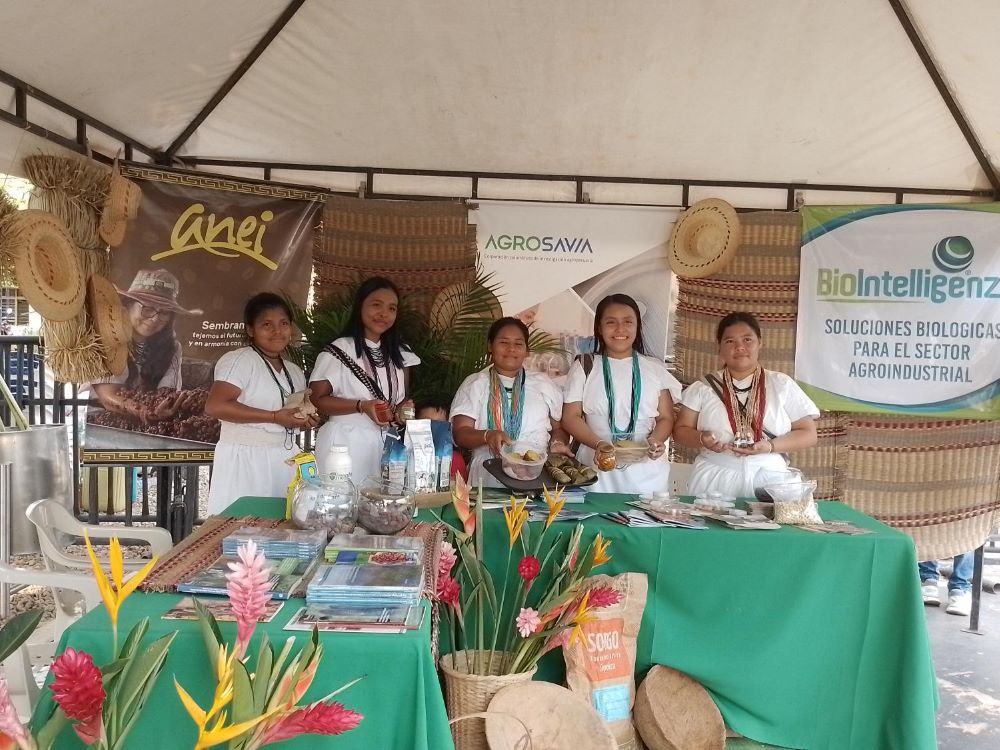The Association of Indigenous Agroecological Producers and Peasants of the Sierra Nevada de Santa Marta and the Serranía del Perijá – Asoanei, main beneficiaries of the Agrilacresiliente initiative of the Consultative Group for International Agricultural Research, obtained the first harvest of agroecological biofortified beans on the Caribbean coast from Colombia.
This achievement was achieved thanks to the establishment of a plot with baskets of biofortified crops registered by the Colombian Corporation for Agricultural Research – Agrosavia and the Alianza Biodiversity – CIAT in the department of Cesar and the Sierra Nevada de Santa Marta.
This plot is novel, since it is the first time that the process of spiritual harmonization of improved varieties has been carried out, which validates its diffusion in the Arhuaco territory, with the approval of the spiritual leaders.
Spiritual sanitation also implies other technical commitments such as the agroecological production of food, in accordance with the Law of Origin that governs the Arhuaco people. In such a way that, despite the strong effect of the La Niña climatic phenomenon in the Sierra Nevada de Santa Marta, an agroecological management was maintained based on traditional biopreparations made by the seedbed of the Arhuaca de Umuriwa community, developed with the support and assistance of Fondo Acción and the Motilonia de Agrosavia Research Center, in the corregimiento of La Mesa, municipality of Valledupar.
The acceptance of the indigenous community of the biofortified varieties achieved a second phase of the Agrilac initiative in Cesar that will focus on monitoring the plots of the Arhuacas families that received seeds, the integration of the gender approach by ethnic groups, a survey rapid market for biofortified beans and the optimization of agroecological management of biofortified crops. Therefore, it is expected to advance in an alliance with Fondo Acción to facilitate both the dissemination of biofortified varieties and the optimization of agroecological management by the Arhuaca families. According to Camila Zambrano, coordinator of Sustainable Rural Development of Fondo Acción, “it is expected that the alliance with AGROSAVIA will allow the strengthening of agri-food autonomy in the four communities. This includes bio-inputs, cultivated plots, culinary encounters and processed products”.
The second phase of the initiative has scheduled a session to consolidate lessons learned as part of the exchange of knowledge that includes the evaluation of the methodology for weaving ancestral and technical knowledge. The administrative director of Café Anei de Asoanei, Sebastián Páez Izquierdo, says that “one of the biggest limitations to the diffusion of biofortified crops is the low availability of ethnic technical assistants trained not only in agrifood crop management, but also in transformation and marketing. , for which he highlighted the contribution of the Agrilac initiative in Cesar in this aspect and the possible chain of actors that can be fostered in conjunction with Agrosavia and Fondo Acción that promotes the strengthening of human resource capacities of the reservation.
So far, the Umuriwa community has expressed acceptance of the seeds that were delivered and high expectations for those they will receive in the second phase. For María Izquierdo, an ethnic technician from Fondo Acción who attends that community, shares that “the community’s expectation is linked to the higher mineral content of the crops evaluated and the opportunity to apply this year the recommendations of the spiritual leaders regarding the planting and harvest dates so that, in this way, the diffusion of biofortified crops spreads in the reservation of the Arhuaco people”.
The articulation of regional and national actors would facilitate the insertion of ethnic communities in other internationally financed projects such as high iron beans from Fontagro and dry beans from Kolfaci.
